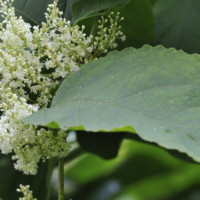
It previously advised that homes where Japanese knotweed was present over seven metres away were a lower risk, meaning they could be approved for a mortgage.
From March, it will ask surveyors to use their discretion when determining the impact of knotweed on a property.
The presence of Japanese knotweed has impacted homeowners’ ability to sell or get a mortgage on affected properties. In some cases, the weed has resulted in a property’s value being reduced by as much as 15 per cent.
The updated guidance follows a 2019 report by the House of Commons Science and Technology Committee, where MPs said lenders were being too cautious about the weed.
RICS said the updated guidance “reflects an improved understanding” of Japanese knotweed.
It added: “The so-called ‘seven metre rule’ focused more on what has been demonstrated to be an overstated risk of Japanese knotweed to buildings, rather than its sometimes-serious impact on amenity.”
It said research demonstrated that Japanese knotweed poses “little or no risk of structural damage to robust buildings with substantial foundations” such as residential homes as opposed to less sturdy buildings with shallow foundations like conservatories and garages.
RICS also said it was more appropriate to control knotweed rather than completely eradicate it. However in some circumstances, such as when construction is proposed, the physical removal of the weed may be needed.
Paula Higgins, chief executive of the Homeowners Alliance said: “This change is well overdue. RICS have been too slow to act on this and have failed to recognise the impact it has been having on homeowners’ lives and finances.
“The exaggerated response to Japanese knotweed by surveyors has caused huge upset to homeowners who have been unlucky enough to find it at the bottom of their gardens. Our homes are our biggest financial investment and should be a place of solace – not a source of worry and dread.”
She added: “No responsible homeowner would leave Japanese knotweed to grow out of control or leave it untreated, but this rule had created unwarranted fear for too long – and also created a mini-industry of firms providing expensive treatment programmes which homeowners needed to pay for if they wanted to sell their homes.”
Homeowners Alliance has also published a guide on how homeowners can deal with Japanese knotweed in their homes.















